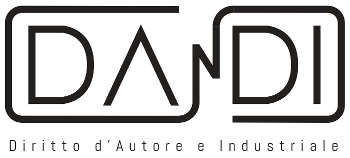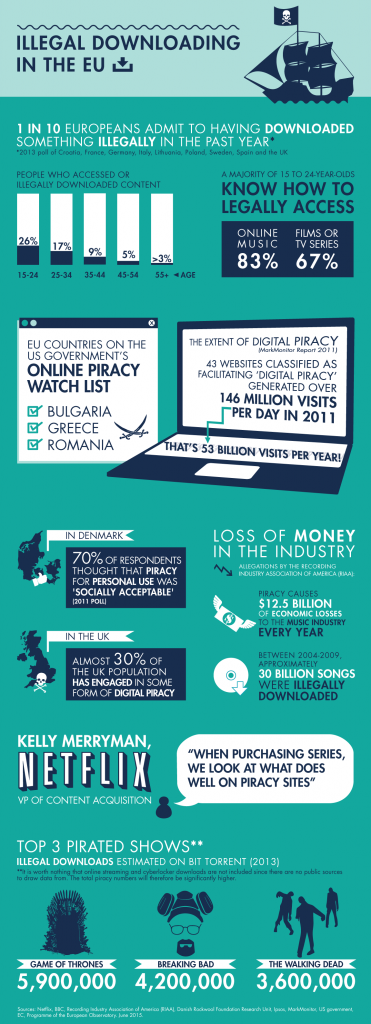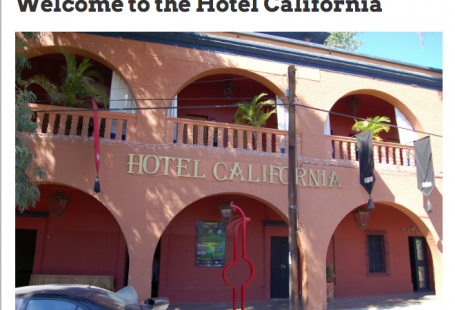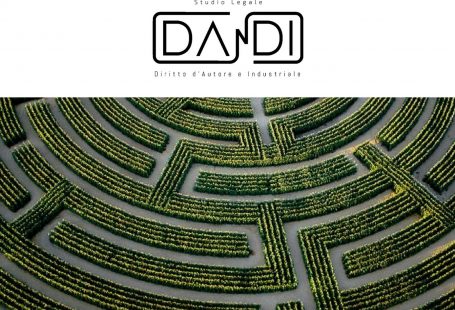Movie Piracy Debate. The illegal download of music and films
The Internet has become an easy tool to connect people and share information. It is a fundamental medium that has become necessary not only to work, but also to exchange opinion, create debate and entertain.
The last one is the main reason for the popularity of the file sharing, and consequently the illegal download of music and films (not to mention the fact that to download audiovisual or music contents from the Internet is cheaper than to buy a CD or a DVD.)
Moreover it is undoubted that the open network nature of the Internet, combined with digitisation, enables the production at low cost of copies of equivalent quality to the original of the work.
Compared to the other media, the Internet is also much more creative. Through the Internet people are able to choose all the audiovisual contents that they want, to remove from their laptops films already seen (or after having seen them) or to download only some songs from a CD or make a selection of their favourite pieces of music or films that they like, to listen, watch and then remove them.
Welcome to “cyberspace”[1] the uncharted territory where freedom reigns and all the imaginations and innovations of the mind are possible and natural where copyright infringement is the “order of the social.”[2]
Movie Piracy Debate. Copyright Law
Within this space there is copyright law, which is often analyzed by reference to economic efficiency,[3] yet dominated by allegations of copyright infringement due to its ability to acquire and disseminate copyrighted works and thus, constitute a criminal activity.[4]
The Internet is an open source medium impossible to control. In particular, the possibility for users to access and copy works placed on the Internet from anywhere in the world makes enforcement of national copyright laws, whose territorial scope is limited, against infringers (both domestic and foreign) very difficult.[5]
The protection of copyright on the Internet therefore raises many legal issues, including:
- the determination of the types of work that can be protected by copyright (e.g. email, websites, computer programs, databases);
- the scope of copyright protection (i.e. moral and economic rights);
- and the exceptions to copyright protection (e.g. the ability to reproduce copyright works.)[6]
Especially the protection of copyrighted works and audiovisual contents in the Internet raises the problem of finding a common, or better said a community, regulation to protect copyright works.
To address the abovementioned issues the EU has adopted regulatory initiatives based on the idea to control and regulate all the changes in the Internet,[7] but the legislation is still confusing and incomplete and technology is faster than regulations, laws and prohibitions.
Movie Piracy Debate. Many questions arise.
Which kind of protection the EU is trying to enforce? What is in reality the position of the EU? Is it more agreed for a free regulation of the Internet or for a complete control of it? What kind of role copyright and related rights may have in the promotion of literary, musical and artistic creativity and economic development? Is it really impracticable to find a unique and global regulation to control copyright works and illegal download in Internet?[8] And finally is it really regulations, prohibitions, limitations what we are thirsty for?
It is undoubted that the ready availability on the Internet of works protected by copyright constitutes a real challenge to the enforcement of copyright law. Yet some voices are against any kind of restriction[8] and in particular, the lack of an adequate protection for works in digital form in certain Member States is considered an obstacle to the development of new products and services.[9]
Legislative action at the EU level has been motivated by the perception that the maintenance of divergent national copyright rules gave rise to legal uncertainty, thereby jeopardising the proper development of the information society, especially electronic commerce, in Europe. [10]
The European Commission therefore recognised the need to ensure an appropriate level of copyright protection across Europe for works on the Internet, which has to be achieved by the harmonisation of national provisions. In fact Intellectual Property Rights in the EU are covered by numerous legislations both at the Community level and the national level.
In the strictest sense there is no European copyright law, rather, there are a number of directives and regulations that forms a “package” of laws that has an impact on the regulation of copyright within the EU, however, it is the Member States of the Union that have their own copyright laws.[11]
In 2004 the European Union introduced a Directive for the enforcement of intellectual property rights,[12] with the objective to approximate legislative systems “so as to ensure a high, equivalent and homogenous level of protection.”[13]
Movie Piracy Debate. The Enforcement Directive concerns measures, procedures and remedies necessary to ensure the enforcement of intellectual property rights.
The EU had hoped that by bringing enforcement measures into line with each other throughout the Union, the Enforcement Directive would have created a level playing field for applying intellectual property rights. The scope of the Enforcement Directive had been widely defined in order to encompass all the intellectual property rights covered by Community provisions in this field and/or by the national law of the Member State concerned.
Thus, the Enforcement Directive
- applies to any infringement of intellectual property rights as provided for by Community law and the national legislations of Member States;
- requires Member States to ensure the implementation of access to evidence, preservation of evidence, right to information, precautionary measures, corrective measures, injunctions, damages and publicity measures;
- implements at the Community level “best practice” measures, which can be found in national laws of the Member States;[14]
- the Enforcement of the Directive is the EU’s response to the illegal download of copyrighted works, yet to enforce restrictions is not the right defense and persecute individual downloaders is an impracticable way to fight illegal downloads and it is also against the right of privacy.
Copyright enforcement refers to the various processes undertaken by right holders after the tracking phase of their battle against P2p file sharers. These processes generally include further investigation to unveil the users of identified IP addresses by obtaining their detailed information from their ISPs, the serving of ‘cease and desist’ notices and the judicial prosecution of identified offenders.
Actually the Internet is an unregulated space where everybody is allowed to express himself anonymously.
Movie Piracy Debate, to continue reading …
Movie Piracy Debate. References and Notes
[1] For a legalistic technical definition of cyberspace see, Jerry Kang, ‘Information Privacy in Cyberspace Transaction,’ (1998) 50 Stanford Law Rev. at p. 1193. [2] It may very well be that this term is not “new” however, I coined it to reflect both literally and metaphorically the usage of the internet as most of its users are aligned to a “social networking group” and where file sharing is a common practice, at the same time, “order of the social” conveys that the internet is seen as a form of rebellion against the establishment and it is used for social activists, “free riders”, creative commons among others. [3] The best place to start a reading on this analysis is the works of William Landes & Richard Posner, ‘An Economic Analysis of Copyright Law,’ (1989) 18 Journal of Legal Studies 2, at pp. 325–363 see also, Tom Palmer, ‘Intellectual Property: A Non-Posnerian Law and Economics Approach,’ (1989) 12 Hamline Law Rev. 2, at pp. 261–304. This work criticize earlier works of Posner, including, The Economics Of Justice, (Harvard College, 1981), and also the then forthcoming work at the beginning of this footnote. Later works include Steve P. Calandrillo, ‘An Economic Analysis of Intellectual Property Rights: Justifications and Problems of Exclusive Rights, Incentives to Generate Information, and the Alternative of a Government-Run Reward System,’ (1998) 9 Fordham Intell. Prop. Media & Ent. L. J., at p. 301. (arguing what types of informational works would require the promise of pecuniary compensation to induce [author’s] creation) and Niva Elkin-Koren & Eli Salzberger, Law, Economics and Cyberspace: The Effects of Cyberspace on the Economic Analysis of Law, Edward Elgar, 2004) especially at pp. 90–107. [4] See, e.g., Robin Andrew, ‘Copyright Infringement and the Internet: An Economic Analysis of Crime,’ (2005) 11 B.U. J. Sci. & Tech. Law 2. [5] Garzaniti L., Telecommunications, Broadcasting and the Internet: EU Competition Law and Regulation, III Edition (2010), Chapters II and III. [6] For a detailed review of these issues, see Hance para.3–001, n.1, 81–100; and Torremans, Copyright law: a handbook of contemporary research (Edward Elgar, 2007). The following section does not discuss the issue of secondary liability for copyright infringements, particularly peer-to-peer file sharing and online infringements: see Strowel, Peer-to-Peer File Sharing and Secondary Liability in Copyright Law (2009). [7] For a discussion of other copyright directives, see Chapter II, para.2–149 et seq. [8] WIPO National Seminar on Copyright, Related Rights, and collective management organized by the World Intellectual Property Organization (WIPO) in cooperation with the Ministry of Culture Khartoum, February 28 to March 2, 2005, pag. 276. [9] Copyleft is an example. It is a play on the word copyright to describe the practice of using copyright law to offer the right to distribute copies and modified versions of a work and requiring that the same rights be preserved in modified versions of the work. [10] Towards a Network of digital business ecosystems, Fostering the local Development, Discussion Paper Bruxelles, September 2002. [11] WIPO National Seminar on Copyright, Related Rights, and collective management organized by the World Intellectual Property Organization (WIPO) in cooperation with the Ministry of Culture, Khartoum, February 28 to March 2, 2005. [12] Pirates of the Internet, at Intellectual Property’s End with Torrents and Challenges for Choice of Law, P. Sean Morris, University of Helsinki – Faculty of Law, International Journal of Law and Information Technology, Vol. 17, Issue 3, pp. 282-303, 2009, available at http://papers.ssrn.com/sol3/papers.cfm?abstract_id=1496687 [13] The European Union (EU) directive on criminal measures aimed at ensuring the enforcement of intellectual property rights is a proposed directive aimed “to supplement Directive 2004/48/EC of 29 April 2004 on the enforcement of intellectual property rights (Civil enforcement)” (Source: Justification for the proposal, COM(2005) 276 final, July 12, 2005). The directive was proposed on July 12, 2005 by the Commission of the European Communities. [14] Directive 2004/48/EC of the European Parliament and of the Council of 29 April 2004 on the enforcement of intellectual property rights (also known as “(IPR) Enforcement Directive” or “IPRED”) is a European Union directive in the field of intellectual property law, made under the internal market provisions of the Treaty of Rome. The directive covers the remedies that are available in the civil courts, but not criminal offenses. [15] Chapter two of the Enforcement Directive outlines the measures, procedures and remedies in a civil setting rather than a criminal one. The Enforcement Directive differentiate four categories of civil measures whenever IP right-holders suspect that there is infringement, firstly, Articles 6–7 allows for measures protecting evidence, secondly, Article 8 allows for right of information “on the origin and distribution networks of the goods are services which infringe and intellectual property right”, thirdly, Article 9 allows for “provisional and precautionary measures” for the prevention and infringement along with protection for claims for damages and fourthly, Articles 10-13 covers compensation and corrective measures following a judicially determined IP infringement regarding enforcement and the amount for civil damages.Dandi Law Firm provides legal assistance in Copyright and Film. Check out our Services or contact Us!






